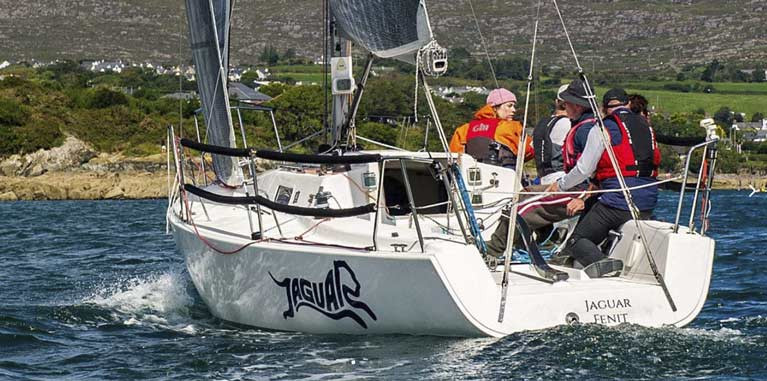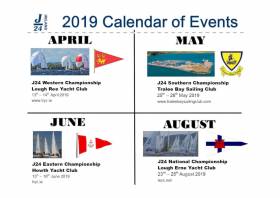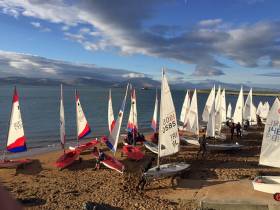Displaying items by tag: Tralee Bay Sailing Club
County Kerry's Tralee Bay Sailing Club Salutes Its 2023 Achievers
2023 was a great year for Tralee Bay Sailing Club, and there was no better way to end it than with a very enjoyable Christmas party catching up with friends, bringing back fun sailing memories and acknowledging some of the great performances club members delivered during the year.
The club organised a very successful GP14 event and looks forward to welcoming national events in the west of Ireland.
 Dathi and Arann Murphy sailing their Tralee Bay GP14 dinghy
Dathi and Arann Murphy sailing their Tralee Bay GP14 dinghy
Some of the club sailors competed at major events over the year. Riona McMorrow-Moriarty led the way with a very strong performance at the Topper World Championships, concluding her challenge in 8th position overall with a series of two race wins in the Gold fleet finals.
Former Irish Academy sailor Ellie Cunnane stepped into the Olympic 49er FX and was thrown at the deep end competing at the World sailing world championships in the Hague.
 Tralee's Ellie Cunnane (on starboard) at the 49erFX Worlds
Tralee's Ellie Cunnane (on starboard) at the 49erFX Worlds
She also competed at the under-23 youth worlds in the class, winning two races in the Silver Fleet. She is now focussing on her studies and delivering some coaching to younger sailors, but no doubt she will return to competitive sailing rather soon.
The youngest of the club Worlds participants was Ben Chaix, who competed at the Mirror event in Sligo, finishing 12th overall and winning the Classic trophy. Ben also sails his Optimist and is an enthusiastic and very promising 9-year-old.
 Ben Chaix of Tralee Bay Sailing Club sailing his Mirror Renaissance at the UK nationals
Ben Chaix of Tralee Bay Sailing Club sailing his Mirror Renaissance at the UK nationals
Cormac Murphy is sailing his Soling from strength to strength, finishing at a very solid 4th place overall at the UK nationals and a 3rd place at the Volvo Dun Laoghaire regatta in Class 4.
 Cormac Murphy practising on his Soling (with sons Dahti and Arann at the front)
Cormac Murphy practising on his Soling (with sons Dahti and Arann at the front)
Also at the Volvo regatta, Ian Magowan had a great Water Wag regatta on Mary Kate, securing 2nd (with two race wins) in the ever-competitive fleet.
The club J24 sailors remained strong, with Tadgh O Loinsigh picking bronze at the ICRA nationals in Howth. Club mate Fergus Kelleher was not too far behind in 7th.
Back home, the club dinghy sailors of the year were young guns Dahti and Arann Murphy on their GP14.
The Cruiser Sailor of the Year was a close contest eventually won by the "old young team" on Elysium, skippered by Liam Lynch.
Last but not least, the awaited Popov award was delivered to John Barry for the biggest mess of the year... a good way to end a great evening with a good laugh!
Owens and Craig Show Flash as Lightning Curtails Day 1 of GP14 Munsters in Tralee Bay
Day 1 of the 2023 GP14 Munster Championships on Saturday (17 June) saw 26 crews arrive at Tralee Bay Sailing Club. This was the first time in over 40 years the fleet had been in Fenit, writes Andy Johnston.
PRO John Leech, having welcomed the fleet at the morning briefing, got the fleet on the water for a midday first gun. Oscillating wind meant a few delays but Race 1 got under way by 12.20pm in about seven to eight knots.
With dolphins surfacing on the start line close to the committee boat, Ger Owens and Mel Morris had a great start and led Sean Craig and Stephen Boyle to the weather mark. Close behind them were JP & Carolyn McCaldin, Ruan & Tash O’Tiarnaigh, Curly Morris and Meg Tyrrell, and Colman Grimes and Ross Gingles.
By start of second triangle, Owens and Craig had extended their lead with Grimes and O’Tiarnaigh and a fast-improving Ross Kearney and Daniel Nelson looking for the last podium spot. Grimes took third with Kearney fourth and O’Tiarnaigh fifth, with Conor Twohig and Matthew Cotter finishing well to take sixth.
The start of Race 2 was AP a couple of times before getting into sequence. Then crashing thunder and lightning interrupted things with the PRO sending the fleet home temporarily.
Within 15 minutes Met Éireann had posted a Status Yellow warning for Kerry, indicating the lightning was here for the rest of the day. That was the trigger to abandon racing, with four races and an earlier start mow scheduled for Sunday (18 June).
Race 1 results can be found on the Tralee Bay Sailing Club website HERE.
Tralee Bay Sailing Club in County Kerry will host this year's ILCA/Laser National Open Championship from this Thursday 18th, to Sunday 21st of August.
Eleven races are scheduled for each of the three fleets over the four-day event, and the weather forecast suggests there should be no problem completing a full programme.
The large entry includes a number of very successful sailors from the class who are sure to be at the sharp end of the fleet when the event finishes.
There is also a large entry of local sailors who have been training very hard for the event in a bid to do their home club proud.
The principal race officer is John Leech, who is well known to the class.
Tralee Bay Stages Skiff Event Over May Bank Holiday Weekend
Tralee Bay Sailing Club in County Kerry is gearing up for a weekend of sailing on the west coast over the May Bank Holiday weekend.
The weekend will start with the club's yearly "Spring Regatta". Four races are scheduled on Saturday, the 3rd of April for the Optimist and dinghy fleets of the club.
The regatta is however open to visitors and last year saw the addition of 29er sailors from Dublin, GP14s from Cullaun and sailors from neighbouring club Foynes.
The weekend will then carry on with the combined 29er westerns and the first-ever "Open Skiff West" event.
The return of a regular season at home has been long awaited for the 29er fleet and the Westerns will launch a great summer of sailing and racing for the fleet. It will be the opportunity for the seasoned partnerships who have raced abroad over the winter to chase home waters honours and for the new partnerships to get finally introduced to racing. Who will add their name under 2019 champions Atlee Kohl and Jonathan O'Shaugnessy?
Skiff sailing is fun and there are many sailors around the country who have enjoyed the thrills of fast downwinds in their local club races. TBSC is offering the opportunity to gather all these speed addicts in a single venue for two days giving the opportunity to share tricks and stories with the more experienced sailors helping out the less experienced to get the most out of their boat. 49er and 49erFX should provide the bulk of the fleet yet we are also expecting a few of the trapezing RS (600, 700 and 800), Musto skiffs and some of the older skiff designs which still line up in various club boat parks around the country.
The event will be run under PY.
Details and entry form are on the Tralee Bay Sailing Club website, download the two NORs below.
Day two of the Mermaid National Championship sponsored by Volvo yesterday at Tralee Bay Sailing Club in County Kerry saw sailors awake to a steady 18 knots gusting 22 when what was expected was 10-12 knots by the forecast! A pleasant surprise by all accounts although with everyone a little rusty after the ‘break’ last year it was going to make for an interesting day on the water.
A slight delay on the first start scheduled for 11 o'clock saw the fleet get away in wet and windy conditions with everyone fully hiked and trying not to fall out! A full Olympic course was sailed with pretty physical conditions, especially on the downwind legs. The Mermaids hummed along with heart rates up at the gybe marks!
There were a number of protests lodged after racing so the results link below are the final results taking into account outcomes of protests, according to organisers.
First race results: 1st place went to 188 Innocence from Foynes Yacht Club helmed by Darragh McCormack and crewed by brothers Mark and Noel. 2nd place went to 102 Endeavour from the Royal Irish Yacht Club helmed by Roger Bannon and crewed by Kate Grimes and Barry Hayes. 3rd place went to 187 Zuleika from Wexford Harbour Sailing Club helmed by Derek Joyce and crewed by Cillian Joyce and Brian Fenlon.
 A Mermaid race start in Tralee Bay
A Mermaid race start in Tralee Bay
With wind strength and direction holding steady the second race got off with no delay, hardly time to eat the sandwich! Results of Race 2: 1st place went to 187 Zuleika from Wexford Harbour Sailing Club helmed by Derek Joyce and crewed by Cillian Joyce and Brian Fenlon. 2nd place went to 119 Three Chevrons from Foynes Yacht Club helmed by Vincent McCormack and crewed by Roisin McCormack and Michael Lynch. 3rd place went to 177 This Is It from Skerries Sailing Club helmed by Mark Boylan, with crew Aileen Boylan and Niall Collins.

The 3rd race start sequence was about 3 minutes underway when a 30 degree wind shift called a halt to proceedings. A much appreciated, very quick rejigging of marks saw the fleet getting off a clean line within 10 minutes for a 3rd and final race of the day. The wind had eased slightly but tired bodies meant a big effort from everyone! The sun was out and a relatively flat sea meant for stunning conditions with the mountains and Samphire Rock making for gorgeous backdrops.
Results of Race 3: 1st place went to 177 This Is It from Skerries Sailing Club helmed by Mark Boylan, with crew Aileen Boylan and Niall Collins. 2nd place went to 188 Innocence from Foynes Yacht Club helmed by Darragh McCormack and crewed by brothers Mark and Noel and 3rd place went to 119 Three Chevrons from Foynes Yacht Club helmed by Vincent McCormack and crewed by Roisin McCormack and Michael Lynch.
Afterwards, competitors exchanged many stories of blocks, cleats, uphauls, downhauls etc. breaking off and lots of improvising going on!
Final results following 5 races can be viewed here
Mixed forecasts again for tomorrow and given how far off today’s was everyone is just waiting to see what the new day will bring...
Dublin Bay Mermaids Make A Return to Tralee Bay Sailing Club for National Championships
The Dublin Bay Mermaid fleet makes a long-awaited return to Fenit, Co. Kerry this week for their annual National Championships. The event, which was originally due to be hosted last year by Tralee Bay Sailing Club but cancelled due to COVID, looks forward to going ahead with four days of Championship racing scheduled from Wednesday the 18th of August to Saturday the 21st.
Tuesday the 17th will see boat measurement, inspection and weight-check from 2 pm onwards as well as a sail measurement facility in place for new sails. There will also be an optional practice race at 7 pm on Tuesday the 17th. Registration will be open from 0900 - 1000 on Wednesday morning with a briefing at 1000 before the boats head out for their first race at 1200.
Ten races in total are scheduled across the four days with the famous ‘crews race’ also planned to follow Championship racing on Thursday the 19th. The crew's race sees the boats have one of their crew swap with the usual helm and is always an interesting one! Principal Race Officer is Scorie Walls with support and mark boats from TBSC as well as Foynes Yacht Club.
There are already 20 pre-entered online with boats coming from Rush Sailing Club, Skerries Sailing Club, Wexford Boat Club, Foynes Yacht Club, the Royal Irish Yacht Club and The National Yacht Club so a strong turnout is expected.
Fenit is a popular venue for the fleet with historical links going right back to the beginning of the class. This event will mark 10 years since a Mermaid event was last held in beautiful Tralee Bay with the Nationals hosted there in 2011 and before that in 2007.
This year's event hosted by Tralee Bay Sailing Club is fortunate to have main sponsor Volvo behind them and a strong team of volunteers ready to put on a great event on and off the water.
An outdoor Championship BBQ dinner is planned for Saturday the 21st to crown the new National Champion with local caterers ‘The Rustic Pantry’ set to serve up a feast and outdoor live music followed by speeches and prize giving. Wishing all competitors the very best of luck and an enjoyable event.
Tralee Bay Sailing Club and the West of Ireland Offshore Racing Association (WIORA) have announced its staging of the 2020 WIORA Championships at Fenit in County Kerry has been postponed until September.
TBSC Commodore Liam Lynch and WIORA Commodore Gary Fort agreed that it would be impossible to run the event under the current restrictions on its original dates from June (24th -29th).
New dates have been agreed for the end of September which will not clash with other events on the cruiser-racer calendar.
The event will now be held over two weekends, Saturday and Sunday, September 19th and 20th and Friday and Saturday, September 25th and 26th.
The Notice of Race and entry forms will be available at www.traleebaysailingclub.ie
There will also be a race to Kilrush on the Shannon Estuary on Sunday 27th to position boats for the RWYCI October Series.
Youth Sailors Converge on Tralee Bay for 'Battle of the Classes' Trophy
The new year dinghy clinic organised by the Tralee Bay Maritime Centre is now in its third year and 2019's edition was a success with 30 boats attending.
16 Optimists including national champion Justin Lucas and Dublin ace Sam Ledoux trained under the direction of French coach Viviane Chaix and former medallist at Optimist worlds Sophie Browne.
Former Academy sailors Darragh O ‘Sullivan and Cian Byrne managed the two Laser groups (10 sailors) while Clinic Manager and lead coach Thomas Chaix worked with the four 29er partnerships.
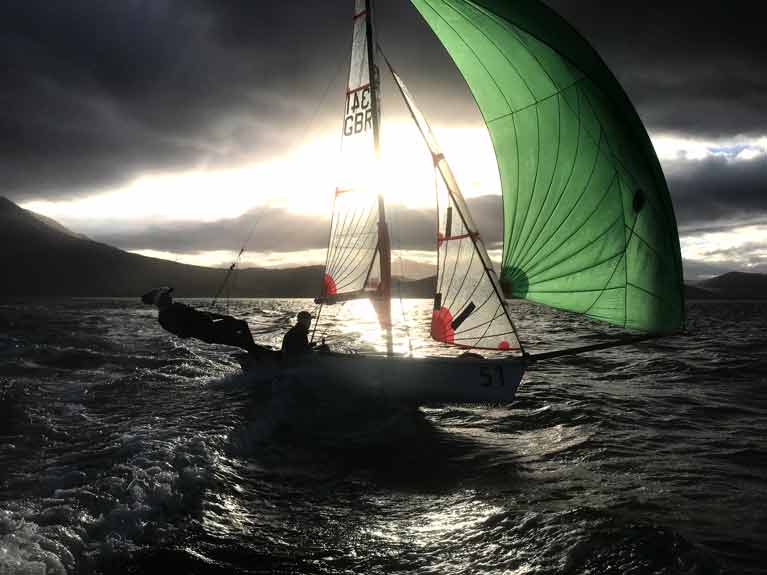 Four 29er partnerships were afloat in Tralee Bay
Four 29er partnerships were afloat in Tralee Bay
The week proved to be outstanding with many hours secured in the mild conditions and great winds ranging from 3 to 18kts. The focussed training with experienced coaches proved to be very efficient and sailors and parents alike were very pleased to have started their new year in Kerry.
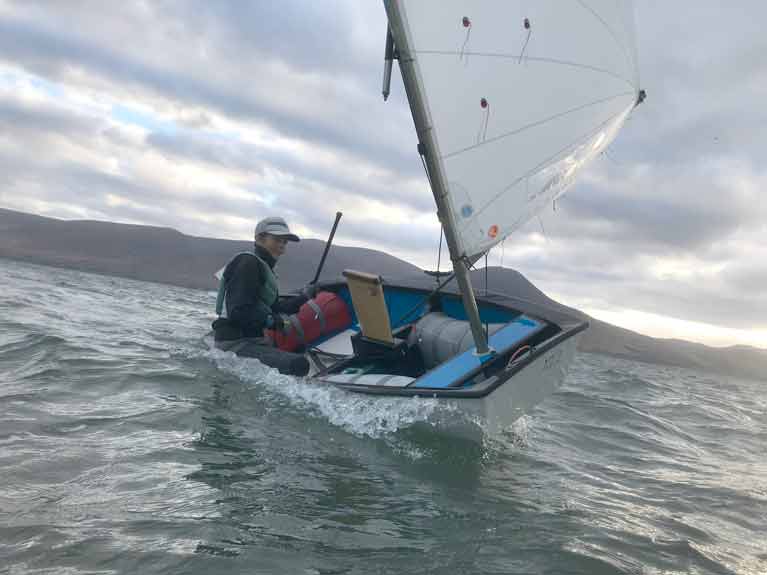 16 Optimists including national champion Justin Lucas and Dublin ace Sam Ledoux trained under the direction of French coach Viviane Chaix
16 Optimists including national champion Justin Lucas and Dublin ace Sam Ledoux trained under the direction of French coach Viviane Chaix
Peter Williams was the recipient of the Maritime Centre coaches award adding his name to the big cup.
The clinic concluded with the traditional regatta run under PY on a windward leeward course. The average lap approach allowed the fast 29er and the slower optimist to compete against each other.
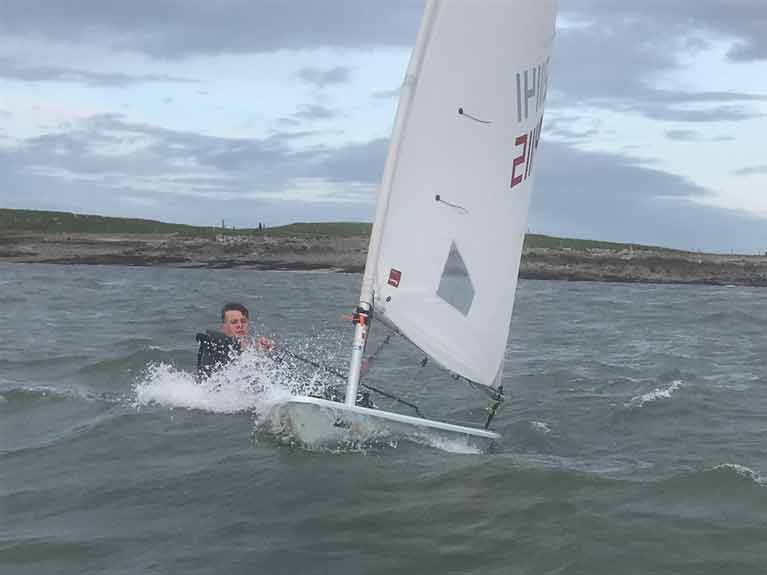 Former Academy sailors Darragh O ‘Sullivan and Cian Byrne managed the two Laser groups (10 sailors)
Former Academy sailors Darragh O ‘Sullivan and Cian Byrne managed the two Laser groups (10 sailors)
Four races were completed in the 15-18 kts Southerly right in front of Fenit beach... Some of the races were very close with mere seconds separating sailors. Eventually, Adam Wash (Laser 4.7) managed to edge out Sam Ledoux and radial sailor Paddy Cunnane.
The new “battle of the classes” trophy was won by the laser 4.7 (Adam Walsh, Harry Pritchard and Stephen Cunnane) ahead of the Optimist (Sam Ledoux, Peter Williams and Killian Reidy). Download results below.
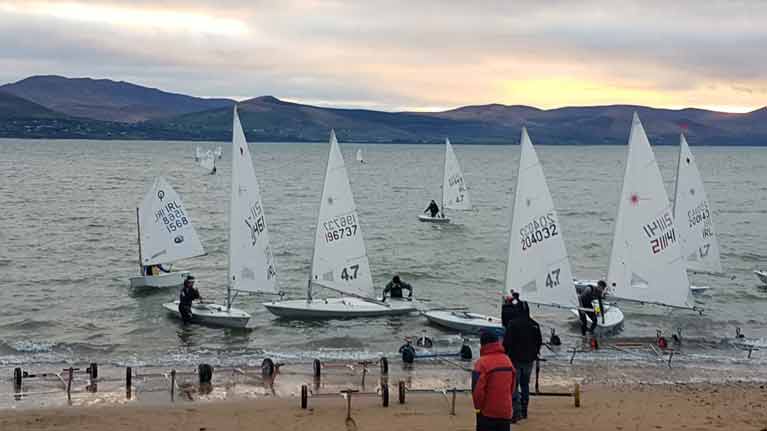 Laser and Optimist Dinghies are recovered in Fenit
Laser and Optimist Dinghies are recovered in Fenit
Lough Ree, Tralee Bay, Howth & Lough Erne To Host J/24 Championships In 2019
The J/24 Association of Ireland has announced the calendar for its regional and national championships in 2019.
Lough Ree Yacht Club will host the class for its Westerns in the first big event of the year on the weekend of 13-14 April — the week before Easter.
The following month the fleet moves to Tralee Bay Sailimg Club for the Southerns on 25-26 May.
Howth Yacht Club will host the Eastern Championship on 15-16 June, and the Nationals on 23-25 August will be sailing out of Lough Erne Yacht Club.
Tralee Bay Maritime Hosts Inaugural Dinghy Race Clinic
Tralee Bay Maritime Centre have over 50 boats on the water this week at Fenit in County Kerry. Brian O'Sullivan, Centre Principal, told Afloat.ie he is delighted with the response to the performance coaching clinic, led by Thomas Chaix, with some of the best junior sailors in the country coming together in three different dinghy sailing classes - Lasers, Toppers and Optimists.
Coaches from Greece, Portugal, France, Poland and Ireland have their hands full with a massive turnout for the inaugural clinic at Europe's most westerly port.


























